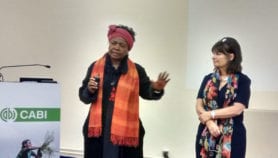By: David Dickson
Send to a friend
The details you provide on this page will not be used to send unsolicited email, and will not be sold to a 3rd party. See privacy policy.
The decision by the United States to return to Unesco provides a new period of opportunity for the UN agency. It must ensure that it uses this opportunity wisely.
Last week's announcement by US President George W Bush that the United States is rejoining the United Nations Educational, Scientific and Cultural Organisation (Unesco) provides one small — if significant — patch of silver lining within the otherwise rapidly-approaching dark cloud of a possible military invasion of Iraq. For the past 18 years, the US has stood outside the one UN agency that has, from its inception in the years after the Second World War, sought to use cultural ties (including those forged through science) to avoid armed conflict. Today, such efforts are needed more than ever.
The return of the United States, which has in the past been responsible for 25 per cent of agency's budget (currently running at US$275 million a year), will provide the extra resources that are desperately needed to allow these efforts to be expanded. It will also, once again, enable Unesco to claim the truly global legitimacy that has been lacking for the best part of two decades, particularly during those years in which Britain was also absent.
But it is also important that the Paris-based agency does not get too complacent about its return to political favour in Washington. On the one hand, many parts of the organisation are still plagued by excessive bureaucracy, divisive internal conflicts and an institutional inertia that even the best efforts of its new director-general, Koichiro Matsuura, have found difficult to shift. Matsuura's much praised reforms may have removed some of the biggest obstacles to effective management; but, whatever Bush's reassuring words, many smaller ones remain firmly in place.
The second reason for caution is that the US decision does not necessarily, in practice, mean that the Bush administration espouses the values that Unesco has traditionally embraced. There are legitimate questions about how far a government that chooses to exclude its senior scientific officials from its delegation to the World Summit on Sustainable Development — or continues to challenge the global consensus on the scientific basis of global warming — is prepared to accept the views of others on such topics, or indeed the central role of scientific understanding in international affairs.
Political opportunism
Indeed, there is an air of political opportunism about Bush's announcement last week that only endorses the need for caution. The decision to rejoin Unesco was not itself taken speedily; it has been on the table in Washington — and steadily rising to the top of the political agenda — for several years. But it had a clear political motivation, namely to blunt criticism of US unliateralism (there are even rumours that the decision was made partly to secure Japan's endorsement of any military action over Iraq).
It is therefore all the more vital that the US re-enrty does not become a type of 'Trojan horse' designed to open the way to the uncritical application of US values, particularly those of the current Republican administration, throughout the agency.
Not that these values are necessarily undesirable. Many, such as a commitment to freedom of expression, to transparency in decision-making and even to the central role of science in modern cultures and economies, underpin a track record that much of the rest of the world can only aspire to. Removed of its political overtones, the US decision to withdraw from Unesco in 1984 in protest at a proposed 'new information order' that directly challenged some of these ideals reflected a serious and legitimate concern that was, to their shame, virtually ignored by many of the organisation's senior officials at the time.
But there are other areas where the situation is much murkier, particularly those in which the strategies considered essential by developing countries to secure their social, economic and cultural development do not necessarily coincide with the economic interests of US-based corporations. Take, for example, the case of climate change, where US intransigence is undermining efforts to establish an effective global strategy. Or renewable energy, where US opposition to concrete targets resulted in one of the most significant failures of the recent World Summit in Johannesburg. Will the United States be tempted to use the agency as part of its strategy to obtain global approval for genetically-modified foods?
Or look at the whole issue of intellectual property rights. Last week, an independent international panel funded by the UK Department for International Development published an extensive report setting out a convincing argument for the need to adjust international patent legislation in a way that takes the genuine needs and concerns of developing countries into account (see Patents 'could hinder poverty reduction'). Doing this, however, would mean abandoning the current 'one-size-fits-all' approach that, under the banner of globalisation, seeks to persuade the whole world to adopt what is essentially a form of patent protection that best meets the needs of US corporations. Little surprise that proponents of global patent reform along the lines suggested in last week's report currently find few supporters in Washington.
The challenges ahead
It would be a serious mistake to argue that such issues have little to do with Unesco's responsibilities for 'education, science and culture'. In fact, quite the reverse; none of these fields of activity can be pursued in today's world as if they are isolated from the economic and technological environment in which they take place. One of the major weaknesses of the World Conference on Science, organised by Unesco in Budapest in July 1999, for example, was that it tried to address science out of context. The lack of attention to technology and innovation reflected an idealistic view of the world that bears little correspondence to today's realities.
The task currently facing Unesco is how to engage its traditional concerns with these new realities. Much has already been achieved in this direction, for example by embracing the role of information technologies, or by examining the moral and ethical dilemmas thrown up by the biotechnology revolution (particularly in genomics). Most recently, Unesco has declared a willingness to rise to the challenges laid down by UN Secretary-General Kofi Annan in Johannesburg to address urgent sustainable development priorities in fields such clean water and sanitation, in protecting the world's biodiversity, and in increasing access to modern energy services.
To the extent that the United States is now prepared to provide the agency with extra resources to achieve these tasks, its return can only be welcomed. The same goes for the increased opportunity that US membership of Unesco will provide to its scientists and technologists to engage in formulating international research in areas of urgent need outlined at the World Summit (and elsewhere).
The challenge for Unesco is to find ways of embracing this agenda constructively and effectively without, on the one hand, faltering in its pursuit of internal reform (much of its efforts to date have been motivated almost entirely by a desire to secure the US return), and, on the other, paying excessive attention to the political agenda of the country that will now be its largest paymaster. It is a major challenge. History will show whether the agency is able to meet it successfully.
© SciDev.Net 2002
More on Networks

Script media release
Journalists offered ‘big break’ mentoring opportunity from Radio Nigeria
03/04/19












